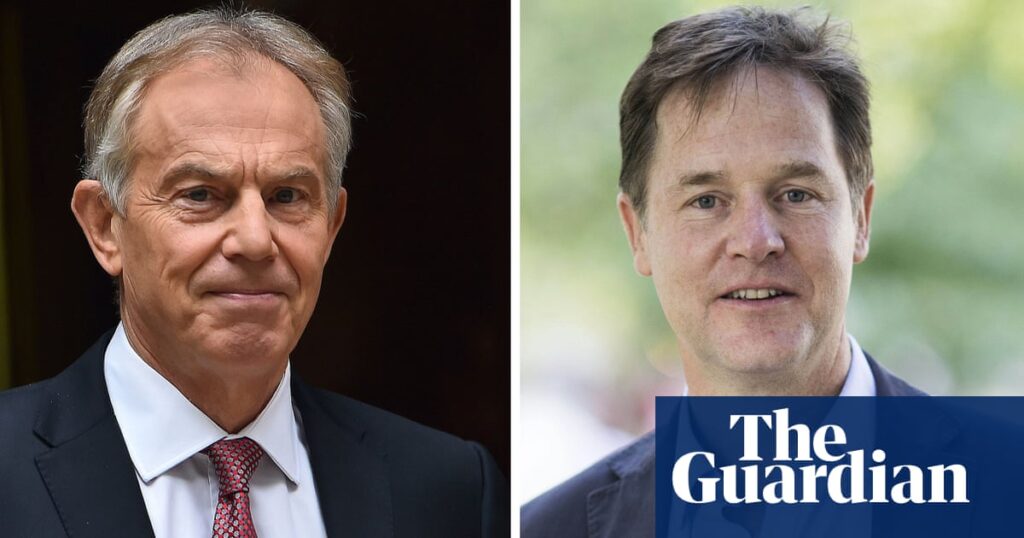Tony Blair and Nick Clegg hosted a private dinner earlier this year at which a select group of technology entrepreneurs were given access to a key minister, official documents have revealed.
The former prime minister, who is a champion of the tech industry, held the dinner in an upmarket London hotel in his capacity as the head of the Tony Blair Institute (TBI) political consultancy.
He and Clegg, the former deputy prime minister who at the time was a senior executive at Meta, invited leaders of six tech companies to dine with Poppy Gustafsson, who was the government’s investment minister responsible for persuading firms to invest in Britain.
Blair is an evangelical proponent of the revolutionary potential of technology to transform faltering public services and has long courted alliances with leaders in the industry. His consultancy has echoed much of this zeal through a stream of policy papers arguing that artificial intelligence should be put at the heart of government.
However, critics are concerned that Blair, who is known to be close to Keir Starmer’s government, has been able to set the agenda without enough public scrutiny. There have also been questions over the reliance of Blair’s consultancy on donations from the Silicon Valley billionaire Larry Ellison, a friend of Donald Trump and Elon Musk.
Ellison, who this year briefly became the world’s richest person, has donated or promised more than $300m to Blair’s consultancy.
The documents released to the Guardian under freedom of information legislation show how the 12 diners discussed the government’s evolving policies on artificial intelligence at what was described a “salon dinner”.
Hosted at the end of January in the five-star Corinthia hotel, the diners included Lonne Jaffe, the managing director of the US venture capital firm Insight Partners, which invests in technology companies.
Also present were Alex Kendall, the chief executive of Wayve, which is seeking to develop self-driving cars; Nigel Toon, the head of Graphcore, which produces computer chips; and Marc Warner, the chief executive of Faculty AI, which published a joint document last year with TBI on how AI could be used to improve public services.
A spokesperson for Clegg, who as president for global affairs at Meta jointly hosted the dinner, said :“During his time at Meta Nick Clegg regularly met with government ministers and leaders from other tech companies. As the executive responsible for policy and global affairs that was literally his job.”
A TBI spokesperson said: “This event was a discussion about a range of issues between tech leaders with a minister in attendance. No company paid to attend.”
The companies represented at the dinner said they had not donated money to TBI, nor hired it.
The dinner illustrates how Blair’s consultancy works to push his pro-technology agenda. Having rapidly expanded, TBI is active in 45 countries with its staff numbering more than 900. Its latest accounts show its income totalled $145m in 2022 from a mixture of fees for its advice and donations. The identities of many of its donors and clients are kept secret.
The consultancy has drawn criticism that its policy positions have been shaped by its donors’ commercial interests – an accusation it has denied. It was also criticised for continuing to take money from Saudi Arabia after the murder of the journalist Jamal Khashoggi in 2018. Blair is in line to play a leading role in the reconstruction of postwar Gaza.
Weeks before the dinner, the government had given TBI a confidential summary of its action plan for artificial intelligence days before it was due to be published. On 9 January, Feryal Clark, then a minister in the Department for Science, Innovation and Technology (DSIT), spoke to Jakob Mokander, TBI’s science policy director, at her instigation.
The next day, an aide to Clark emailed Mokander to say: “It was great talking to you yesterday. As a follow-up please see this confidential summary of the action plan. Thank you for agreeing to amplify publication of the plan on Monday through your network and supportive quotes.” Mokander replied: “Thank you for sharing the action plan (confidentiality noted).” Blair backed the action plan, aimed at expanding the country’s role in developing and deploying artificial intelligence, when it was published on 13 January.
Asked why it had given early sight of this document to TBI, a spokesperson for the DSIT said: “We make no apologies for regularly engaging with stakeholders. It is standard practice to share embargoed information with them ahead of announcements.”
The TBI spokesperson said: “It is standard practice for governments to consult experts and engage a wide range of stakeholders when shaping policy. The AI opportunities action plan rightly drew on our published work, as the footnotes make clear.”
Quick Guide
How to contact our investigations team
Show

The best public interest journalism relies on first-hand accounts from people in the know.
If you have something to share on this subject you can contact our investigations team confidentially using the following methods.
Secure Messaging in the Guardian app
The Guardian app has a tool to send tips about stories. Messages are end to end encrypted and concealed within the routine activity that every Guardian mobile app performs. This prevents an observer from knowing that you are communicating with us at all, let alone what is being said.
If you don’t already have the Guardian app, download it (iOS/Android) and go to the app menu. Pick ‘Secure Messaging’, follow the instructions to compose your message and select ‘UK Investigations Team’ as the recipient.
SecureDrop, instant messengers, email, telephone and post
If you can safely use the tor network without being observed or monitored you can send messages and documents to the Guardian via our SecureDrop platform.
Finally, our guide at theguardian.com/tips lists several ways to contact us securely, and discusses the pros and cons of each.

